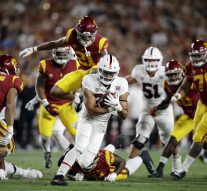
The Biggest Problem In College Sports
Lifestyle & Opinion October 30, 2019By Max Thorpe
More than 460,000 students compete in 24 sports in college every year. These “student-athletes” are controlled by the NCAA (National Collegiate Athletic Association). This corrupt multi-billion-dollar company treats the college athletes that they represent so poorly and unfair, compared to normal college students. While there have been uproars about college athletes deserving to get paid, considering some sports bring in hundreds of millions of dollars each year, the NCAA needs to start by just treating college athletes the same as every other college student.
Bo Jackson, a world-famous athlete who played in the NFL and MLB and is the only professional athlete to be named an All-Star in two sports, was involved in one of the most well-known NCAA scandals. In college, Jackson attended Auburn University, where he was a star athlete in football and baseball. In 1985, Jackson was awarded the Heisman Trophy, which is given out to the best football player in college for that season. Jackson was preparing to play baseball the following spring but ended up getting ruled ineligible due to accepting a “gift”, which is illegal for NCAA athletes. The “gift” that Jackson accepted was a plane ride that was paid by the Tampa Bay Buccaneers to pick Jackson up and take him to Tampa, who were interested in drafting him for the 1986 season. The Buccaneers simply wanted to meet with him and work him out (Auman). If any other college student were to attend a job interview for a big company, they would be able to accept all the free gifts, dinners and perks that would come with the meeting, simply because they are not a part of the NCAA. But since Bo Jackson is a college athlete, he is not allowed to accept “gifts” like a paid trip for a job interview and ended up getting ruled ineligible for his baseball season.
Greg Anthony is another college athlete superstar who had problems with the NCAA. The Former UNLV legend was told he couldn’t keep his basketball scholarship because he was running his own business. The business Anthony was running was a T-shirt printing company so he could raise money for his mom, who had cancer (Hruby). Imagine if a regular student at UNLV was creating a clothing company. They could start their business, hire other college students as employees, and make a ton of money, all while still attending college classes. There are no rules or regulations for normal college students when it comes to making money. It’s simply not fair for regular college students to be able to start a business, or even have a job (college athletes are not allowed to work a job), while college athletes aren’t even allowed to raise money for a family member, or even themselves.
Tim Tebow is arguably the most famous college athlete of all time. He was voted by ESPN as the best college quarterback of all time (ESPN). He was the first sophomore to win the Heisman trophy, and by the end of his college career, Tebow broke 5 NCAA, 14 SEC (South Eastern Conference), and 28 University of Florida records (ESPN). On top of all that, he was clean-cut, handsome, and a religious Christian who prayed before every game, and after every touchdown. He was loved across the whole country, and if the NCAA had no rules against making money off of one’s likeness, Tebow would have made thousands. If you were to attend or watch a Florida Gator football game, then you would notice that most fans who were wearing a gator jersey had one with #15 on it. That was Tebow’s number. The University of Florida and the NCAA made an immense amount of money off jerseys and ticket sales, and Tebow didn’t make a single cent even though he was responsible for a good portion of the income. If college athletes could make money simply off their likeness, Tebow, and many other athletes would benefit greatly. Not only through jersey sales, but potential endorsement deals from various companies and brands would also be able to target college athletes. Unfortunately, that is not yet the case.
The NCAA is still selfishly keeping money away from college athletes, but they might not be able to do so for long. The California Governor Gavin Newsom just recently signed a bill, that is effective in 2023, allowing college athletes in the state of California to hire an agent, and make money from endorsement deals. This is the first big step, and I’m sure many states are going to follow in California’s footsteps in the next couple of years. It is time to allow these student-athletes to be treated with equality and respect, just like their classmates.
Header photo from theconversation.
Auman, Greg. “When Bucs Blew It by Drafting Bo Jackson.” Tampa Bay Times, Tampa Bay Times, 25 Aug. 2019, https://www.tampabay.com/sports/football/bucs/when-the-bucs-blew-it-by-drafting-bo-jackson/2226917/.
Curtis, Dave. “THE SELLING OF TIM TEBOW.” OrlandoSentinel.com, 12 Oct. 2018, https://www.orlandosentinel.com/news/os-xpm-2008-01-01-jersey01-story.html https://www.espn.com/video/clip/_/id/27654258.
Harris, Jasmine. “In the Name of ‘Amateurism,’ College Athletes Make Money for Everyone except Themselves.” The Conversation, 7 Oct. 2019, https://theconversation.com/in-the-name-of-amateurism-college-athletes-make-money-for-everyone-except-themselves-114904.
Hruby, Patrick. “College Athletes Need to Fight for Their Own Union.” UNIONIZE COLLEGE ATHLETICS, Sports on Earth, 8 Apr. 2013, http://www.sportsonearth.com/article/44209014/.
“Tim Tebow.” ESPN Press Room U.S., ESPN, https://espnpressroom.com/us/bios/tim-tebow/.





